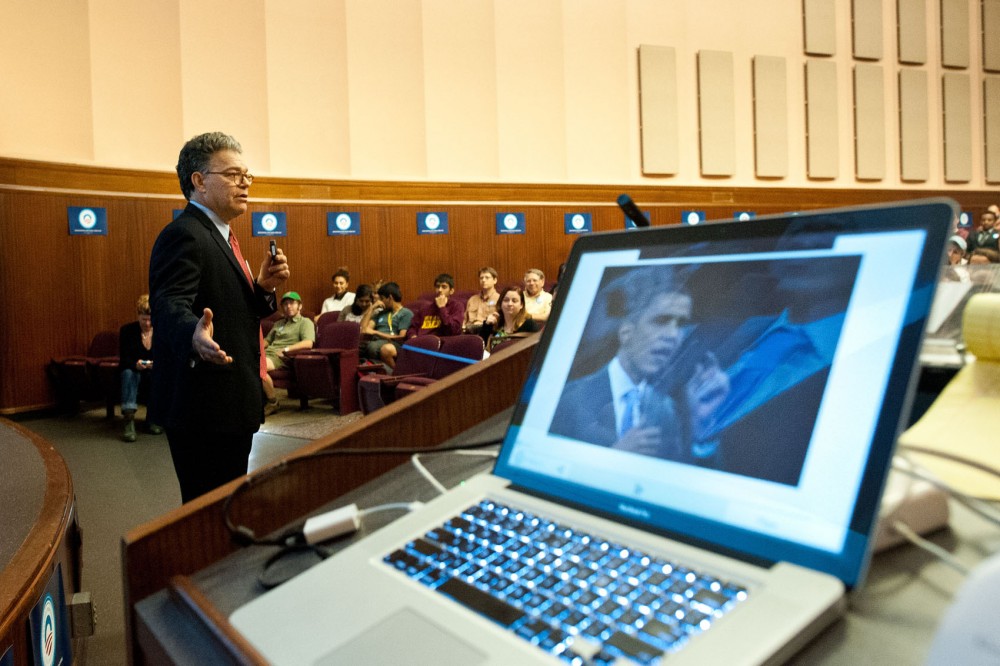Wednesday night, President Barack Obama and challenger Mitt Romney faced off in the first presidential debate of the 2012 election.
Obama and Romney argued over their differing stances on domestic policy issues like the federal budget, the state of the economy and Medicare.
The debate, like all facets of the election, drew commentary and analysis from political pundits and experts alike.
The Minnesota Daily turned to University of Minnesota political science research associate Robin Phinney for her take.
Phinney analyzed the candidates’ highs and lows, proposed economic policies and potential implications for the rest of the election.
What were some high points of each candidate’s performance?
I think the candidates had strong points in drawing distinctions from one another. They were both effective — and the moderator helped with this, too — in identifying the precise places in their policies where they disagreed.
Obama often mentioned a supposed $5 trillion tax-cut plan by Romney, but Romney denied this as a plan. Who’s lying?
The $5 trillion amount comes from the reduction in the tax rates that Romney’s proposing.
Romney’s saying that he wants to reduce the marginal tax rates, but he’s not going to increase the overall size of the deficit because he’s going to close loopholes. But he won’t specify which loopholes that he’s going to close.
Absent any information on what tax loopholes he would close, there’s just information on how much revenue the government is going to lose from the tax cuts.
I think that for Romney to effectively argue that Obama is not being truthful about the $5 trillion amount, he needs to specify which deductions and loopholes he’s going to close, and that will allow him to more effectively counter that claim.
Obama often criticizes Romney for his lack of specificity regarding his economic policies. Did Romney effectively explain his plans in the debate?
He spoke in a lot of generalities. When he goes through his five-point economic plan, he says things like “you’re not going to balance the budget,” and “I’m proposing a revenue-neutral tax reform,” but he doesn’t really get more specific than that.
Both candidates brought up personal anecdotes about interactions with people in campaign travels, who used this tactic most effectively?
I think Romney did it more effectively than Obama did.
There were a number of times where Obama went into personal examples or just flushed out how a policy would work by referencing a particular family situation, but he was so long-winded in his personal examples. Romney was more concise with his personal anecdotes.
I think Romney was trying to show that he can connect with the average voter.
Do you think Romney’s aggressive performance changed how people perceive him?
The debates offer a pretty good chance for people to assess whether the challenger looks like he can take on the president.
I think Romney was really effective in going toe-to-toe with the president. I don’t think he was necessarily overly aggressive to the extent that he changed people’s opinions on how they view him. I think it makes him look more presidential.
Romney talked a lot about his time as governor of Massachusetts. What was he trying to accomplish in doing this?
One of the times that he talked a lot about his time in Massachusetts, he was particularly referencing the bipartisan nature of his involvement there, which was then an overwhelmingly Democratic-leaning state.
Part of what he’s trying to do is get the independent and moderate voters, and so he’s trying to appeal a bit to that.
It was reported that Romney prepared for the debate by practicing “zingers.” Were there any zingers that stood out to you?
Not the type of zinger that you’ve gotten in past campaigns. I don’t think anything said would go into a YouTube compilation of “The Best Zingers of the Presidential Debates.”
But there were clearly some pretty well-rehearsed lines that Romney delivered, like the line about his five boys or “you’re entitled to your house and your plane but not your facts.”
There were a couple of lines that challenged the accuracy of the claims that Obama was making that seemed like they must have been rehearsed beforehand.
What effect will this debate have on the election?
I think the challenger usually gets a bump following the first debate. I think it will take a little time to see exactly what the impact on the polls will be, particularly for undecided voters.
I think it seems likely that Romney will get a bit of a bounce in the polls. Whether that persists depends on the other things the campaigns are doing. I think you’ll see a stronger performance from Obama in the remaining two
debates.
Who “won” this debate?
I think that stylistically, Romney probably won the debate. I think he came across as more composed and more prepared.
He engaged directly with the president more than the president engaged with him.
In terms of clarification of his points and the content of his policy proposals, I’m not sure that I would call him a winner.













